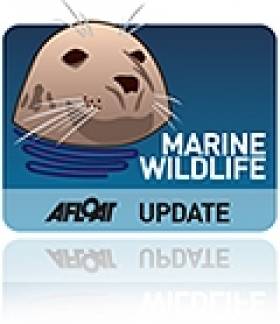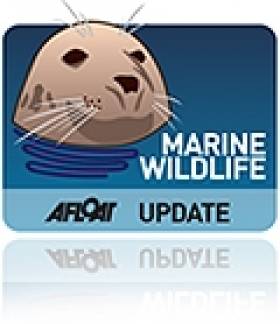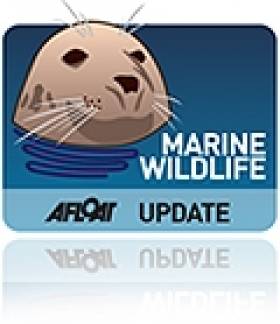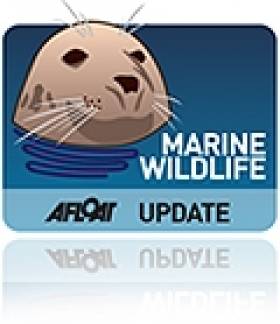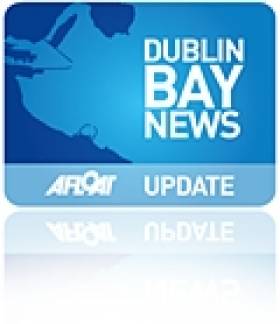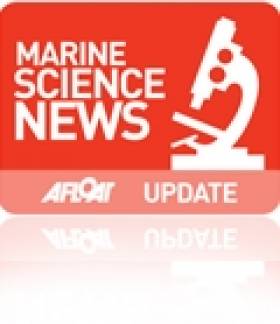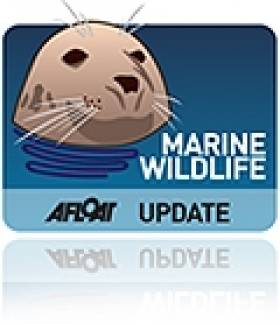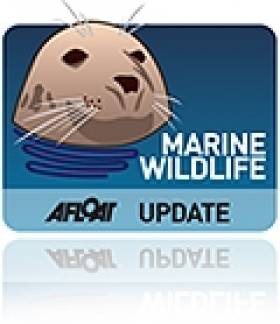Displaying items by tag: marine wildlife
Causeway Coast Is The Place To Be To See Dolphins In Their Element
#MarineWildlife - The Causeway Coast is fast becoming a mecca for dolphins – and dolphin watchers, as the News Letter reports.
Now regularly spotted from the mainland between Ballycastle and Lough Foyle, the dolphins – which may number as many as 70 – are believed to have followed the Gulf Stream as its warm waters have dropped down towards the north coast.
But they're not just here for a holiday, as food is of the essence – hence their habit of approaching boats in big numbers in search of a bite to eat, or in the hopes of stirring up a big mackerel feast.
Rathlin Island appears to be a particular hotspot for the boisterous cetaceans, but Malin Head in Donegal also seems to be within their swimming grounds, as previously reported on Afloat.ie.
Marine Wildlife Numbers Worldwide Have Halved In 45 Years Says Study
#MarineWildlife - Marine wildlife populations around the globe have been halved since the 1970s, according to a new study on the state of the world's oceans.
And despite efforts since the 1990s to stem the decline, overfishing and habitat loss are the biggest culprits, say the World Wide Fund for Nature and the Zoological Society of London.
As the Irish Examiner reports, the conservation study analysed statistics for more than 1,200 marine species – fish, mammals, bird and reptiles – and found a startling 49% fall in numbers compared to 1970s records.
In some individual cases, the decline is even worse - with fish in the tuna and mackerel family only a third of what they were in number four decades ago.
The Irish Examiner has much more on the story HERE.
#MarineWildlife - Two friends were caught by surprise by a playful pod of dolphins off Donegal's Malin Head in recent days.
And as UTV reports, one of them was quick enough to capture the exciting encounter on video.
“Apparently this area of sea is a migrating route from north to south," said Belfast fishermen Neil McCann, who was holidaying in the area with a friend.
"If you think about that, then Ireland is in the way, so they have to pass around the tip of Malin Head. Fishermen are now calling the area the dolphin capital of Ireland.”
The headland on the Inishowen Peninsula, which marks the northern end of the Wild Atlantic Way, has also been hailed this week for its potential as a 'shark park' reserve, with all the makings of a major marine wildlife tourist attraction.
Whale Carcass Causes A Stink On Donegal Beach
#MarineWildlife - Locals near Magheraroarty Beach in Co Donegal were left with a smelly situation last week after the remains of a whale buried on the strand were washed back onto the surface in a matter of days.
According to The Irish Times, the sperm whale carcass was first found beached on Friday 19 June and buried under the sand where it was found by Donegal County Council over that weekend.
However, on Monday 22 June the cetacean carcass reappeared after it was washed back out from its burial place with the tide.
And in its more advanced decomposing state, the noxious odour was beginning to cause a stink among regular beach users and locals alike. The Irish Times has more on the story HERE.
'Shark Park' Could Be Big Draw For Wild Atlantic Way
#MarineWildlife - Ireland's basking shark visitors could be a big money-spinner for the Wild Atlantic Way, as Independent.ie's Travel TV reports.
The second largest fish in the sea are a regular summer sight off Ireland's coasts, particularly in Donegal, Mayo and Kerry – all prime spots along the western coastal tourism route initiative.
Indeed, Ireland is one of the best places in the world to see these magnificent examples of marine wildlife, says Emmett Johnston of the Irish Basking Shark Study Group.
And according to Dr Pete 'Hammerhead' Klimley, sites like Malin Head could be perfect as 'shark park' reserves to protect a species that may only number a few thousand worldwide, despite recently placing third in a list of the most unusual sharks.
Certainly such a shark park reserve would afford protections to help avoid the shocking harassment of marine life exhibited by two louts videoed 'surfing' a whale shark recently.
According to the Irish Mirror, calls have been made for the men involved in the sickening stunt to be charged for their abuse of the gentle giant, the largest fish in the world's oceans.
Stranded Dolphins Saved By Kerry Locals
#MarineWildlife - Common dolphins stranded in a Kerry river last weekend were saved by the quick actions of local people, as The Kerryman reports.
Trapped by the fast receding tide at the mouth of the Cloghane Estuary on the Dingle Peninsula last Saturday (20 June), the group of dolphins were fortunate they didn't have to wait long for the community to spring into action.
Following a report from local woman Shelia Mulcahy, Louise Overy of Dingle Oceanworld and her sister Tabitha co-ordinated efforts that involved area fishermen and landlubbers alike, keeping the dolphins wet till enough people arrived to help move the protected marine wildlife back into deeper waters.
The Kerryman has more on the story HERE.
Dublin Bay Designated As UNESCO Biosphere Reserve
#DublinBay - Dun Laoghaire Marina brings our attention to some great news for Dublin Bay, which has been designated as a UNESCO biosphere reserve.
As RTÉ News reports, the biosphere status has been expanded from Bull Island to cover the entire 300 sq km of Dublin Bay, the city and county – becoming the only such reserve in the world encompassing a major urban area.
The designation also coincides with the the new Dublin Bay Biosphere Partnership, which seeks to promote greater "balance between people and nature" and future sustainability in an area that's home to many protected species of marine wildlife.
The Irish Times has much more on the story HERE.
Cold Water Corals Growing In Abundance Off Porcupine Bank
#MarineScience - An international team of scientists led by Prof Andy Wheeler of University College Cork have discovered a new habitat for coral in Irish waters – possibly doubling the amount of cold water corals previously thought to exist in the area – while on the Marine Institute's RV Celtic Explorer during the QuERCi survey.
While conducting research on Irish cold water coral reefs, Prof Wheeler investigated a submerged vertical cliff 800m below the sea surface and found it covered in coral.
"The seabed just falls away into a deep chasm. We couldn't wait to take a look down there, using the Holland I remotely-operated vehicle [or ROV] which is equipped with cameras and robotic sampling arms," he said.
Prof Wheeler and his team have been investigating Irish cold water coral reefs for over 15 years. In the deep, cold, dark Atlantic, these corals form reef habitats supporting a diverse and abundant ecosystem.
It was while mapping and inspecting some previously unconfirmed reefs on the edge of the Porcupine Bank Canyon, 300km offshore from Dingle, that the scientists decided to venture further into the canyon itself.
The ROV Holland I was manoeuvred from a 2,100m water depth in the middle of the canyon, up the canyon wall to the coral reefs clustered around the canyon top at 700m water depth. The bottom of the canyon was choked with organic-rich particles flushing down the canyon on the way to the abyssal plain.
"It was like flying the ROV through a snow blizzard," said Dr Chris McGonigle of Ulster University, "but we just pushed up the canyon and it got steeper and steeper and steeper until we faced this vertical cliff face several hundred metres high."
The cliff face, never seen by humans before, was covered in corals and other associated organisms.
"These near vertical habitats hardly feature on maps yet can be hundreds of metres high and extend for tens of kilometres. This is a massive habitat, barely explored, yet full of ocean life", said Dr Agostina Vertino of the University of Milan-Bicocca. "We found many species of coral, sponges, crabs and fish."
Prof Wheeler believes it is "not unfeasible that there is over 100sqkm of coral habitat that was previously unaccounted for."
The coral discovery site has already been designated a Special Area of Conservation due to coral reefs in the vicinity. Yet despite its protection, the international team lead by Prof Wheeler found snagged fishing gear and litter.
"It is a great shame, we are the first people to see this place yet despite of its remoteness there is still evidence of human impacts," he said.
The RV Celtic Explorer is Ireland's state-of-the-art research vessel and has been recently equipped with new seabed mapping sonars giving unprecedented views of the seabed. The ship is also the dive platform for the Holland I ROV.
"The quality of the data that this ship and ROV can now collect is phenomenal," said Dr McGonigle. "We were seeing details on the seabed that a few years ago we could only have dreamed of.
"This increase in data quality will allow us to develop a much greater understanding of the processes controlling the distribution of life in these unique environments."
Congratulating Prof Wheeler and the team on their discoveries, Mick Gillooly, director at the Marine Institute, said "we are delighted to see the recent upgrade of the Celtic Explorer and the ROV Holland's multibeam sonar suite producing such amazing results for this expedition.
"The high resolution images produced are fundamental in helping scientists with their research as well as helping us provide a better understanding our ocean."
#MarineWildlife - A paddleboarder "still can't believe" the moment when a humpback whale surfaced right under his board off West Cork earlier this week.
As the Irish Examiner reports, Jason Coniry was out for a paddle with fellow boarders off Inchydoney beach on Wednesday evening (17 June) when the ocean giant appeared suddenly before him.
Luckily for the Corkman – who took the 'special endeavour' award in the Ocean to City An Rás Mór last month for being the first ever stand-up paddle board entrant – the whale was nothing more than curious about him and his fellow humans on the surface.
And Coniry has the presence of mind – and the available tech – to record the incredible marine wildlife experience on video to share with the world.
“Instinct guides us as to when it’s unsafe," he said of the respectful close encounter. "The whale’s movements are very intentional and accurate. If it did not want us near it, we would definitely have known.”
The humpback visitor was certainly in safer company than fellow whales in the Antarctic, where Japan is expected to resume whale hunts by the end of the year – despite the International Whaling Commission not being satisfied of the need to hunt for research purposes.
The Irish Examiner has more on that story HERE.
Kayakers Land Tope Shark For A Snap Off Inishowen
#MarineWildlife - A group of sea anglers off Donegal's Inishowen Peninsula got more than most would bargain for last week when they landed a shark – with video to prove it.
But far from fearful at the prospect, Graham Smith and friends told the Irish Examiner that they actively seek out such fishy predators as the tope shark, a few of which they caught while out kayaking in recent days.
"They normally range from 20lb to 45lb," he said of the small fighters, "but there are bigger ones around later in the year."
It's all in good sport, however, as the vulnerable species – also known as the school shark or snapper shark – were returned to the water "to terrorise the small fish of Inishowen."


























